Grapeseed oil vs jojoba oil – they are both popular, natural beauty oils, but which is best and when?
Jojoba oil and grapeseed oil contain beneficial nutrients for your skin and hair. These nutrients provide nourishment and can be used for a variety of purposes.
I love jojoba oil as it is so gentle on the skin and unlikely to create an allergic reaction. In my opinion, however, one of the best options is to mix the two oils. This way, you will benefit from all the nutrients these two oils have to offer.
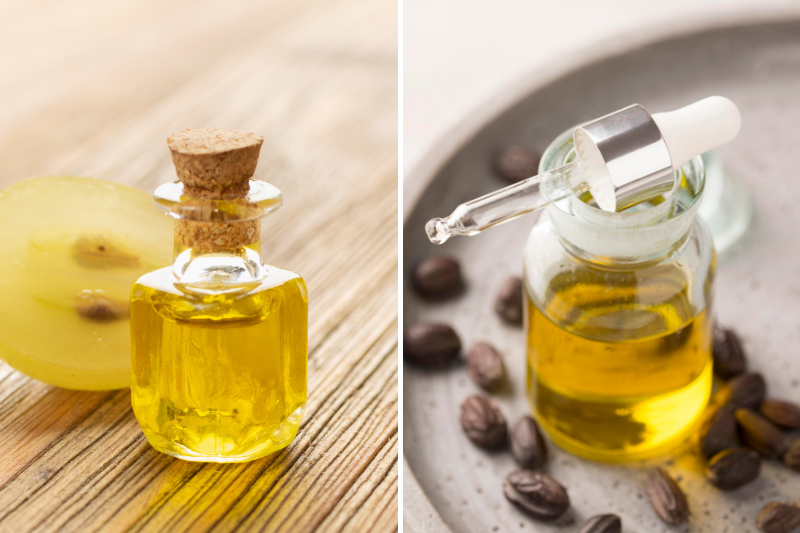
So, you may be wondering why grapeseed oil and jojoba oil are so great for the skin.
Below I am going to take you through all you want to know about each of these oils, including their benefits and similarities and differences. I also discuss which is best for the face, skin and hair and what benefits come from mixing the two oils. From all of this, you’ll be able to determine whether your prefer grapeseed oil or rosehip oil.
What Is Grapeseed Oil?
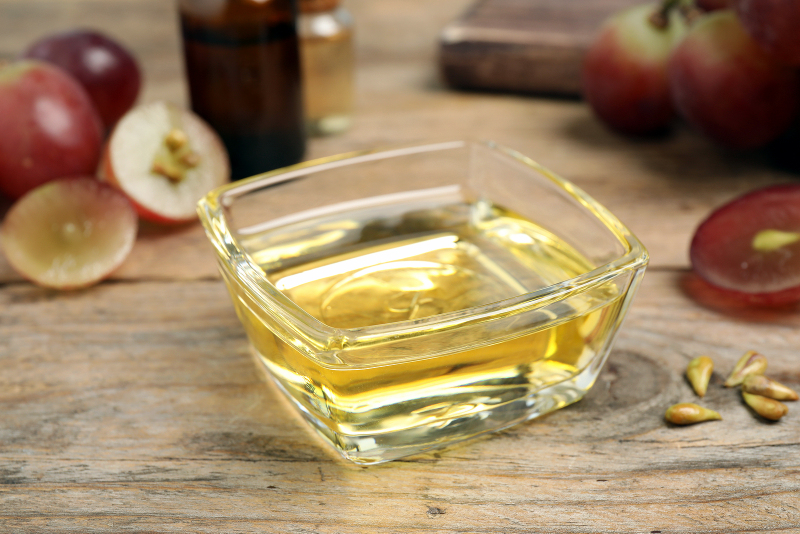
Grape seeds make grapeseed oil. It’s traditionally made as a byproduct from pressing grapes for wine. It is lightweight in texture and can be used in both beauty preparations and cooking.
Grapeseed oil absorbs quickly into the skin, is lightweight, and it leaves the skin feeling soft, soothed and moisturized. It also contains anti-microbial and anti-inflammatory properties, essential fatty acids, vitamins and antioxidants which are great for your skin.
Grapeseed oil is a great choice as a carrier oil because of its fast-absorbing quality and its lack of aroma.
Benefits Of Grapeseed Oil
There are a number of benefits of using grapeseed oil. I have listed some of these below.
Evens Skin Tone
Grapeseed oil has the ability to even your complexion as it contains an antioxidant called proanthocyanidin. It is claimed that this antioxidant can even the skin tone when applied regularly and made part of your skin care regimen.
Appropriate For All Skin Types
Grapeseed oil can be used by all skin types as it is light, fast absorbing and non comedogenic, meaning it will not clog your pores.
It contains high levels of essential fatty acids and antioxidants which provide some anti microbial and anti inflammatory power. However, those with acne should perform a patch test first just to be on the safe side as it can cause allergic reactions in some people.
Fast Absorbing and Lightweight
Grapeseed oil is very lightweight and it absorbs fast into the skin making it a good choice of oil for those with oily skin who still want to use a facial oil.
These qualities also make grapeseed oil a good option for using with essential oils as a carrier oil.
Makes A Great Moisturizer
Grapeseed oil is soothing and hydrating on the skin and makes a great moisturiser. It absorbs quickly and doesn’t leave the skin feeling greasy.
What Is Jojoba Oil?

Jojoba oil is derived from the jojoba plant that grows throughout Arizona, California and Northern Mexico; Native Americans have been using jojoba oil for hundreds of years.
Jojoba oil was traditionally used in medicine and cooking. Although jojoba oil is called an oil, it is not an oil; it is a liquid wax that melts at 10 degrees Celcius.
Jojoba oil on the skin mimics sebum, the natural oils our body produces to protect and hydrate the skin.
There are two types of jojoba oil, refined and unrefined.
Jojoba oil that is refined is what you will most often come across as it is a popular addition to pre-made beauty products. Refined jojoba oil is usually preferred over unrefined because it doesn’t go off as quickly. Sadly, this means it also loses some, if not most, of its nutrients.
Jojoba that is unrefined is processed more naturally. It keeps its earthy aroma, golden colour and nutrients in tact. However, it does not have as long of a shelf life as refined jojoba oil.
I personally recommend always using unrefined jojoba oil for moisturization as it retains all its nutrients and will provide more benefit to the skin than refined.
Benefits Of Jojoba Oil
There are plenty of benefits to using jojoba oil and I have listed a few below.
Works As An Effective Moisturizer
Jojoba oil works as an effective moisturizer by forming a protective layer over the skin, trapping moisture in to keep the skin hydrated. It is different from many other moisturizers as it does not moisturize the skin from within, rather it provides the protective barrier to keep the moisture in.
All Skin Types
Unlike some other oils, jojoba oil is a very light oil on the skin. It can be used by all skin types and even those with very sensitive skin types. Dry skin conditions, such as eczema, dandruff and psoriasis, can also use jojoba oil.
There are no allergens present in jojoba oil and so it is claimed that allergic reactions associated with this oil are very rare.
However, to be on the safe side, if you have sensitive skin, I recommend performing a patch test before using jojoba oil freely on the skin.
Protects Skin
The barrier that jojoba oil provides on the skin for trapping moisture also protects your skin from contaminants. It can protect your skin from UV rays, chemicals, dirt and germs.
Jojoba oil can also help with the production of collagen which can create skin cell regeneration, repairing damaged skin. This can help to heal wounds faster, reduce appearance of scars and prevent scars.
Grapeseed Oil Vs Jojoba Oil
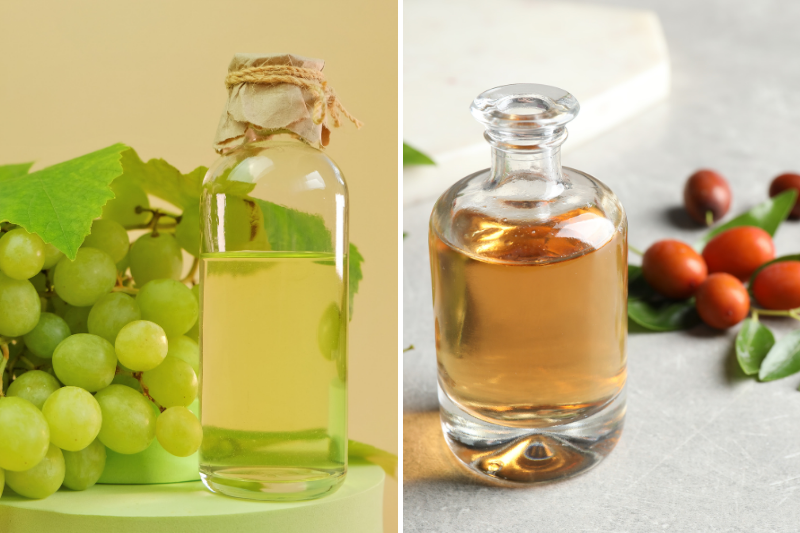
Grapeseed oil vs jojoba oil for skin, face and hair, which one should you use?
These oils have plenty in common but they also have their differences. Below I will take you through the similarities and differences between these two oils to help you choose which is best suited to your skin.
Similarities Between Grapeseed Oil And Jojoba Oil
All Skin Types Can Use It
Grapeseed oil and jojoba oil can both be used by all skin types . However, like I have said previously, you should always perform a patch test before applying the oils all over.
Both are lightweight and fast absorbing
Grapeseed oil and jojoba oil are both super lightweight and fast absorbing into the skin. This makes both oils a good option for those with oily or acne prone skin. Again, patch test first.
Effective Moisturizers
Jojoba oil and grapeseed oil are both effective moisturizers that leave the skin soft, supple and hydrated.
Reduce Look Of Scars and Ageing
Jojoba oil and grapeseed oil can both reduce the look of scars and stretch marks and both can be helpful with anti ageing due to their high fatty acid and antioxidant content.
What Is The Difference Between Grapeseed And Jojoba Oil?
Composition
Grapeseed oil is an oil whereas jojoba oil is actually a waxy ester. It appears as an oil at room temperature where it is actually wax that melts at 10 degrees Celsius. Jojoba oil does not have the same reaction on the skin and hair as a true oil like grapeseed oil.
Jojoba oil mimics the sebum (natural oil) that our body makes. The skin believes that sebum is being released when applying jojoba oil. This makes it potentially effective at treating oily skin and acne.
Allergic Reactions
The possibility of allergic reactions between these two oils varies. Jojoba oil is a safe option for those with sensitive skin types as it doesn’t contain any known allergens so allergic reactions are rare.
Grapeseed oil can cause more problems in individuals with very sensitive skin types. Those who are allergic to grapes may find they are also allergic to grapeseed oil.
It is important to note that people who take anticoagulants and medicines to decrease blood pressure and cholesterol should consult with their physician before applying grapeseed oil as it can increase circulation in these individuals.
Allergic reactions associated with grape seeds include rashes, swelling of the mouth, tongue, lips, itching, difficulty breathing and more. Therefore, if you have sensitive skin, you may want to consult your physician before using grapeseed oil.
Jojoba Oil Vs Grapeseed Oil For Skin
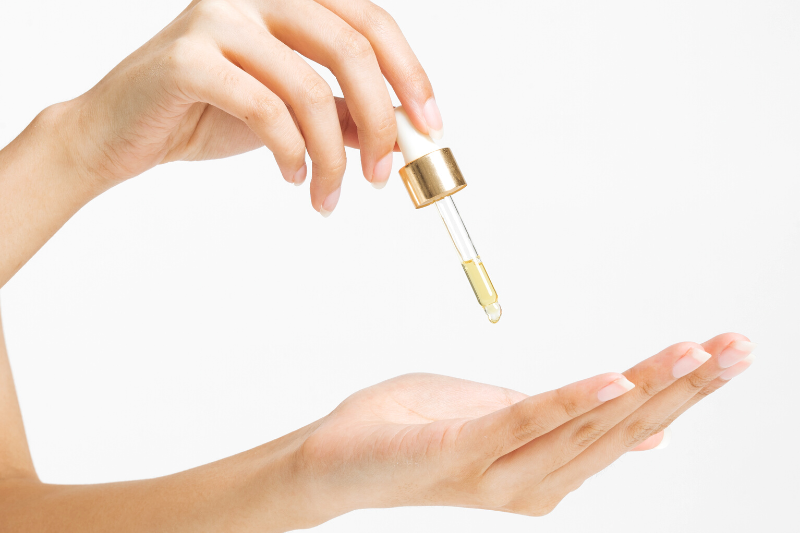
Now you know some of the similarities and differences between grapeseed oil and jojoba oil, it is totally up to you which is better suited to your skin.
Both oils are going to keep your skin hydrated, soft and supple. Both oils are lightweight and absorb fast into the skin.
Jojoba oil is a waxy ester that provides moisture by providing a barrier on your skin whereas grapeseed is a true oil. Grapeseed oil has more potential to cause adverse reactions, so if you experience very sensitive skin, jojoba oil may be the one for you.
Jojoba Vs Grapeseed Oil For Face
Jojoba oil and grapeseed oil are both lovely options for use on the face. They are both lightweight and fast absorbing and are beneficial for most skin types.
It’s up to you which is better suited to your skin needs.
Grapeseed Oil Vs Jojoba Oil For Hair
Grapeseed oil and jojoba oil are both good for the hair.
Neither grapeseed oil or jojoba oil are better at caring for the health of your hair. They both provide moisture and help promote healthy hair.
There has been no evidence to say that either of these oils can help with hair growth. However, when your hair is well looked after it is less likely to have breakage and it encourages growth.
Can You Mix Grapeseed Oil And Jojoba Oil?
Yes, you can absolutley mix grapeseed oil and jojoba oil.
Mixing these two oils is a great way to receive the benefits of both and I highly recommend it unless, of course, you have a grapeseed allergy.
Conclusion
So is grapeseed oil better than jojoba oil? It really depends on what you are using the oil for and your personal preferences.
I hope you have enjoyed this guide about grapeseed oil and jojoba oil and I have answered all the questions you have regarding these two great oils.
You can also learn how jojoba oil compares to rosehip oil here and almond oil here. Or check out more guides to using jojoba oil for your DIY recipes here.

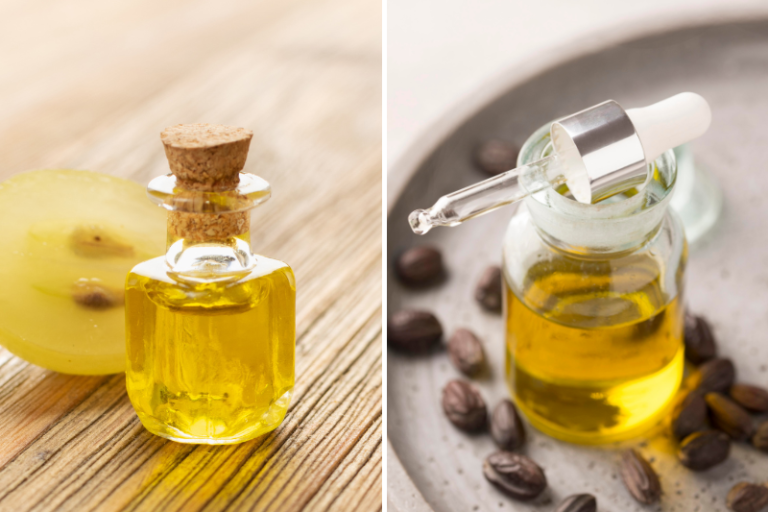
Comments are closed.